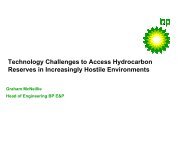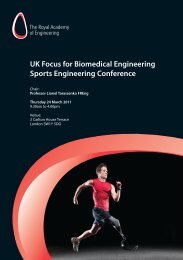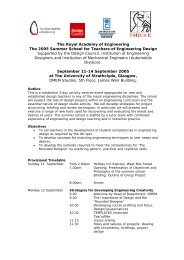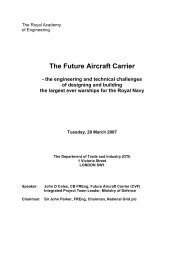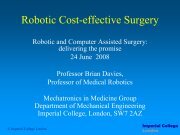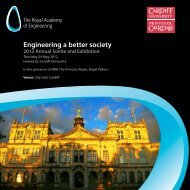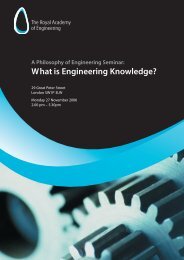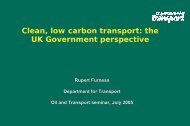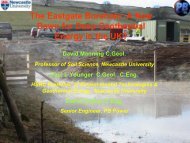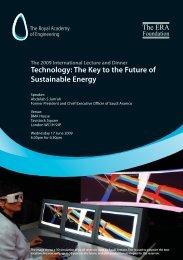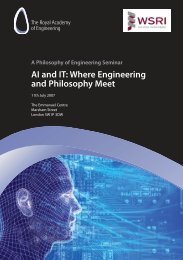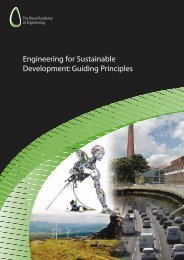RAE Annual review - Cover - Royal Academy of Engineering
RAE Annual review - Cover - Royal Academy of Engineering
RAE Annual review - Cover - Royal Academy of Engineering
You also want an ePaper? Increase the reach of your titles
YUMPU automatically turns print PDFs into web optimized ePapers that Google loves.
New technologies and human health<br />
In partnership with the <strong>Royal</strong> Society,<br />
and the national engineering and<br />
science academies <strong>of</strong> the US and China,<br />
the <strong>Academy</strong> launched a series <strong>of</strong> three<br />
high-level international symposia in<br />
the frontier field <strong>of</strong> synthetic biology.<br />
The first symposium, hosted jointly by<br />
the <strong>Academy</strong> and the <strong>Royal</strong> Society in<br />
April 2011 in London, brought together<br />
world leaders in academia and industry<br />
to explore the economic and social<br />
impacts <strong>of</strong> synthetic biology.<br />
The meeting was addressed by the<br />
Rt Hon David Willetts MP, Minister for<br />
Science and Universities, who has since<br />
set up a synthetic biology leadership<br />
council. The second meeting took place<br />
in Beijing. The third and final event <strong>of</strong><br />
the series, to be held in Washington<br />
in June 2012, will look ahead at the<br />
next generation <strong>of</strong> technologies in this<br />
field and the infrastructure needed to<br />
accommodate them.<br />
The <strong>Academy</strong>’s Biomedical <strong>Engineering</strong><br />
Panel ran a meeting for engineers,<br />
regulators, patient groups and<br />
clinicians on the uptake <strong>of</strong> innovation<br />
in the NHS. This event focused on how<br />
engineers can work with the NHS to<br />
deliver improved prevention, diagnosis<br />
and treatment <strong>of</strong> illness and featured<br />
talks from industry, academia and<br />
regulators. The Panel also submitted a<br />
response to the NHS Innovation Review<br />
undertaken by Sir Ian Carruthers in<br />
September.<br />
In collaboration with the other three<br />
national academies, the <strong>Academy</strong><br />
held a multidisciplinary workshop<br />
on human enhancement in the<br />
workplace, looking at pharmaceutical<br />
intervention, regenerative therapies and<br />
engineered devices.<br />
Pr<strong>of</strong>essional leadership<br />
A report on <strong>Engineering</strong> governance<br />
highlighted the value <strong>of</strong> engineering<br />
advice for business and government<br />
decision-making. A set <strong>of</strong> ethical<br />
practice case studies was published<br />
for use by engineering companies<br />
and engineering educational<br />
institutions. A meeting on safety in<br />
engineered systems considered the<br />
recommendations <strong>of</strong> the Haddon-Cave<br />
<strong>review</strong> <strong>of</strong> the Nimrod disaster.<br />
The <strong>Academy</strong> hosts an alliance <strong>of</strong> the<br />
engineering pr<strong>of</strong>essional organisations,<br />
<strong>Engineering</strong> the Future, which works with<br />
<strong>Engineering</strong> the future <strong>of</strong> water<br />
Along with climate change and food security, water security<br />
is one <strong>of</strong> the biggest challenges <strong>of</strong> this century. Following on<br />
from the April 2010 report Global Water Security – an engineering<br />
perspective, a series <strong>of</strong> events was hosted by the <strong>Engineering</strong> the<br />
Future alliance last autumn. These events addressed challenges<br />
and identified potential solutions for securing the UK’s fresh<br />
water supply, ultimately focusing on local water recycling, water<br />
transfer, behaviour change and demand management. A report<br />
<strong>of</strong> the key issues covered can be found on the <strong>Academy</strong> website.<br />
Panellists at the second <strong>Engineering</strong> the Future Global Water Security debate<br />
(l-r) Pr<strong>of</strong>essor Roger Falconer FREng; Yvette de Garis, Head <strong>of</strong> Environment and<br />
Quality Strategy, Thames Water; John Lawson FREng<br />
<strong>Engineering</strong> education workshop,<br />
Zimbabwe<br />
The <strong>Academy</strong> plays a leading role in the<br />
Africa-UK <strong>Engineering</strong> for Development<br />
Partnership, an alliance <strong>of</strong> engineering<br />
organisations in the UK and Africa that<br />
aims to build engineering capacity<br />
in Sub-Saharan Africa. One <strong>of</strong> the<br />
partnership’s 2011 activities was to<br />
host a workshop in Zimbabwe on the<br />
theme <strong>of</strong> engineering education.<br />
The workshop brought together 40<br />
academics and policy makers from<br />
11 different Sub-Saharan African<br />
countries to explore how engineering<br />
education in Sub-Saharan Africa<br />
could be improved and better aligned<br />
with international development<br />
goals. The workshop also allowed<br />
the Africa-UK Partnership to develop<br />
government to support development<br />
and delivery <strong>of</strong> national policy.<br />
Following a request from the<br />
Department <strong>of</strong> Energy and Climate<br />
Change, the alliance produced a report<br />
on Nuclear Lessons Learned, examining<br />
issues for those engaged in delivering<br />
<strong>Engineering</strong><br />
the Future<br />
Nuclear Construction Lessons Learned Lessons Learned<br />
Guidance on best Best practice: Practice: welding Welding<br />
1<br />
informed recommendations on<br />
the future work <strong>of</strong> the partnership<br />
in the field <strong>of</strong> tertiary education.<br />
Speakers discussed the need for<br />
improved engineering education<br />
across Sub-Saharan Africa to boost<br />
the economy, build infrastructure<br />
and deliver the Millennium<br />
Development Goals. Delegates were<br />
asked for recommendations on<br />
areas in which the future activities<br />
<strong>of</strong> the A-UK Partnership could aid<br />
the development <strong>of</strong> engineering<br />
education. Suggestions put forward<br />
included pairing schemes between<br />
UK and African universities, efforts<br />
to update curricula, development <strong>of</strong><br />
better links between industry and<br />
academia and provision <strong>of</strong> up-to-date<br />
equipment.<br />
the new fleet <strong>of</strong> nuclear power plants.<br />
<strong>Engineering</strong> the Future published a series<br />
<strong>of</strong> best practice guides on concrete,<br />
nuclear safety culture and welding<br />
concrete for the nuclear new build<br />
supply chain and related industries.<br />
The alliance also developed a set<br />
<strong>of</strong> timelines showing planned and<br />
expected infrastructure development<br />
as well as longer term challenges across<br />
major areas <strong>of</strong> national infrastructure.<br />
This work was referenced in HM<br />
Treasury’s National Infrastructure Plan,<br />
published at the end <strong>of</strong> 2011.<br />
The alliance has contributed written<br />
evidence to a number <strong>of</strong> government<br />
consultations and parliamentary<br />
inquiries, and has provided oral<br />
evidence to Select Committee inquiries<br />
on the role <strong>of</strong> departmental Chief<br />
Scientific Advisors and the role <strong>of</strong><br />
engineering in government.<br />
The <strong>Academy</strong> hosts a network <strong>of</strong> people<br />
working in science and engineering<br />
policy roles across over 30 organisations,<br />
Dr Sanzan Diarra, CEO <strong>of</strong> the Zimbabwean<br />
Institution <strong>of</strong> Engineers, addressing the Africa-UK<br />
<strong>Engineering</strong> for Development Partnership in<br />
November 2011<br />
known as PolicyNet. During the year,<br />
PolicyNet held events on the impact<br />
on science and engineering on House<br />
<strong>of</strong> Lords Reform; the impact <strong>of</strong> new<br />
media on science and engineering, and<br />
a session on the roles <strong>of</strong> science and<br />
engineering in social mobility issues.<br />
Left: The <strong>Engineering</strong> the Future alliance<br />
published three best practice guides<br />
during the year covering nuclear safety<br />
culture, welding and concrete<br />
16 17



